We love a lot about where we live in Sheffield. Walkley has a community spirit, a village feel, and you can bump into people you know when you’re out and about. There are independent shops and a lot of great people.
But there’s also a darker side, which Louise and Pippa faced bluntly this week.
They’d been meeting people at a café, and Louise was out on the pavement on her phone, trying to check with them about the blanket that she’d left somewhere. She was feeling slightly stressed, as Pippa doesn’t like sleeping and was unsettled. She will go off in the pram if she is kept moving, so we do a lot of rocking the pram back and forth.
So, Louise, on her phone, standing on the pavement (at the green opposite Asda), pushing Pippa back and forth in the pram.
Something makes Louise turn around, and she finds a driver wanting to mount the kerb to drive onto the part of the pavement she and Pippa are using. She’s a person on a pavement, they’re a driver in a car on the road. The rules are clear – she doesn’t need to move for this. She turns away and continues rocking the pram.
The driver flashes his headlights to get her attention.
Busy with other things and not feeling like escalating a confrontation, Louise moves away from the car and he drives onto the pavement and parks.
Getting bullied is pretty upsetting, and sometimes you try to make a bully face the effect of what they are doing.
She stands by the car and waits for him to get out.
“Sorry, I believe the pavement is for people, not cars.”
A simple enough, polite and factual statement.
As he turns away, the driver shrugs, saying “well, we live in the modern world”, and walks off to the shops.
A few questions
- How does this make you feel?
- Is this the kind of “modern world” you want to live in?
- Should we expect to be able to park wherever is most convenient to us, regardless of the effect on others?
- If not, what causes this expectation? Is it just inconsiderate individuals, or is there encouragement to assume entitlement by the authorities who are responsible? The city council decides where parking is allowed, how much it should cost to use (or be ‘free’, ie paid for by all), and how to enforce the rules. They loudly advocate for the freedom to drive and park, and the local councillors in this ward included ‘increased parking’ in their past achievements in the area. These decisions set the incentives for our behaviours, and the boundaries of what is acceptable in how we live together in a community – do they protect the freedoms of everyone or encourage a culture which our streets can’t sustain?
- Is being able to park near shops needed for them to have customers? Or can it be a hindrance, creating an area swamped with vehicles and so less appealing as a place to visit?
- Is it possible for us to fit into our community all the driving and parking we wish for, and at the same time be a place where people – especially older people and children – can enjoy, walking about without noise, danger and pollution, and can spend time and build relationships? If not, which side of this balance should we – and our leaders – be tilting towards?
- In most of Walkley there is enough room to park fully on the road without blocking it. Is the reason (even if subconsciously) for parking on the pavement to protect the owner’s car from damage, or trying to be considerate to other drivers by leaving the roadway wider and easier to drive along – at the expense of that same consideration for people using the pavement?
- Where there actually isn’t space to park properly, does this mean that we are beyond saturation point and cannot fit this many vehicles into our streets? What would lead to fewer cars in the area? Would rental-on-demand services like City Car Club make unnecessary some cars which are only used occasionally, by giving people a cheaper, and still convenient, alternative way to use a car without needing to own one?
- If our streets were designed differently, with some (doesn’t need to be all!) of the space used by parking on key routes like South Road changed into wider pavements or protected cycleways, would alternatives to driving like walking and cycling be more appealing choices for more people?
What this looks like
These are not exceptional. This is Walkley every day now.

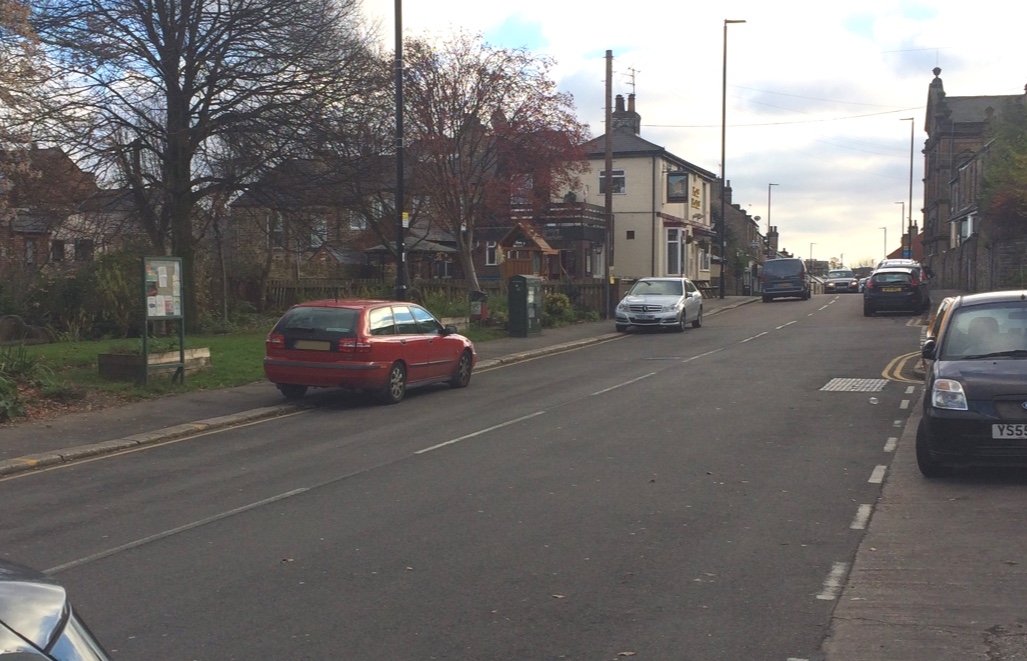
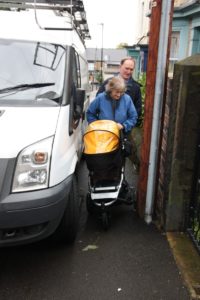
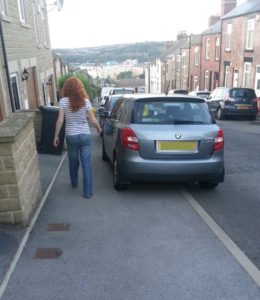
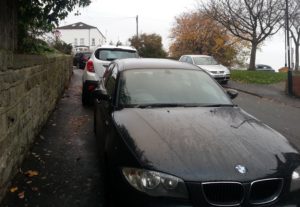
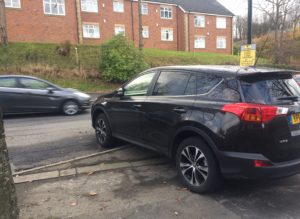
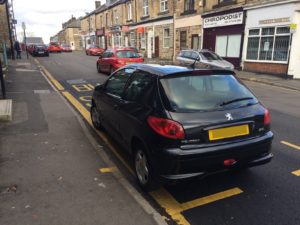
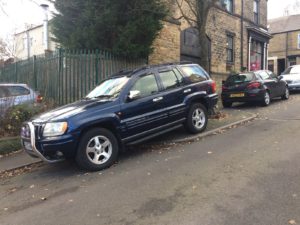
Obstructing traffic is an offence on both carriageway and footway, Section 137 Highways Act 1980 – You may find that your city traffic wardens have the powers to issue fines for this offence, most of those vehicles would seem to be prime candidates. There may also be the option of photographic evidence being accepted. The maximum fine should this go to court is level 3 £1000.
If the vehicle weighs over 7.5T the the Police can use Section 19 RTA 1988 which makes both driving and parking a large vehicle on a footway an offence. Work with your local community policing units on this.
The law is an ass however when it comes to Section 72 Highways Act 1835 – which makes it an offence to ride or drive a carriage or beast on the footway – cycles were legally defined as carriages in 1888, motor cars in 1903. To be charged the offender has to be caught in flagrante delicto, yet for every other traffic offence (speeding, red light running, using bus lanes etc) a photo can be used and the registered keeper will be fined.
Finally remember that a parking restriction (yellow lines) applies to the outside edge of the footway so even if the car is 4 wheels on the footway the parking restriction still applies.. Happy ticketing
Hi DH, thanks for this detail. Have you got experience of these powers being used? And/or of successful education warning campaigns? It would be best to achieve change before just making people resent wardens even more.
How sorry I personally feel for ‘Louise’ depends on whether she’s a car driver herself. Because the real problem is a society addicted to doing almost everything by car. If you’re a pedestrian or cyclist, but you also drive – even for what you consider necessary trips (work etc) – then you’re part of the problem. We need en masse not only to get out of our cars to walk and cycle more, but to sell our cars and change our lifestyles to suit.
I worked for Friends of the Earth for a couple of years, but in the end it was too much for me that ten members of a local group would use 9 or 10 cars to get to committee meetings to talk about transport pollution.
I also used to shop in Walkley (by bike or bus) about 15 years ago, and traffic was bad enough then – I can’t imagine what it’d be like now that cars have doubled in size (much like their owners’ waistlines). But it wouldn’t be like that if EVERYBODY realised that the world doesn’t exist for our own personal convenience.
Hi Jack
I wonder how many people you have converted with your attitude? People are just people. I understand your frustration, honestly. But we need to work together to improve things for everyone, not pit ourselves against each other.
It wouldn’t take you much reading on this blog to find out just how sorry you should feel for Louise (no quote marks required).
Hi Sam. No offence meant by my message – just trying to give a different angle. And the quotes for Louise weren’t meant as disparaging – it was just to show that I don’t know her, so I was kind of generalising with her name rather than with her as a person.
I’m sorry if you thought my tone too illiberal. But for the last 30 years, as long as I can remember, the problems your post covers have been getting worse, much worse. In an ideal world, yes, I agree, let’s work together. But this isn’t that world, and, as with global warming, the longer we go on talking about things instead of taking real action by utterly changing our lazy, consumerist lifestyles, the more drastic the steps will have to be to stop the destruction.
Thanks for allowing my post, anyway.
Thanks Jack. I don’t mean that working together means not trying to completely change the way our cities work for people. Only that changes usually need to be brought about with people, no just to them, to have success. It’s harder than just berating them for not already agreeing, but it might get us further.
Of course, when cars are parked so badly on pavements like that, I sometimes think it would be absolutely terrible if you happened to have bought some sharp pointy metal thing, and you just happened to walk past them, and the aforementioned sharp pointy metal thing just scraped along the pavement side of the (illegally) parked car…
I wouldn’t endorse vigilante action. It would be unfortunate if accidental damage was caused by people being forced to squeeze past on narrow pavements.
If a vehicle forces a pedestrian onto a road to pass and/or prevents a person in a wheelchair or with a pram from passing then police can issue a non-endorsable FPN. Inadequate investment in public transport and other infrastructure over the last 30 years have created a beast which will be difficult to deal with.